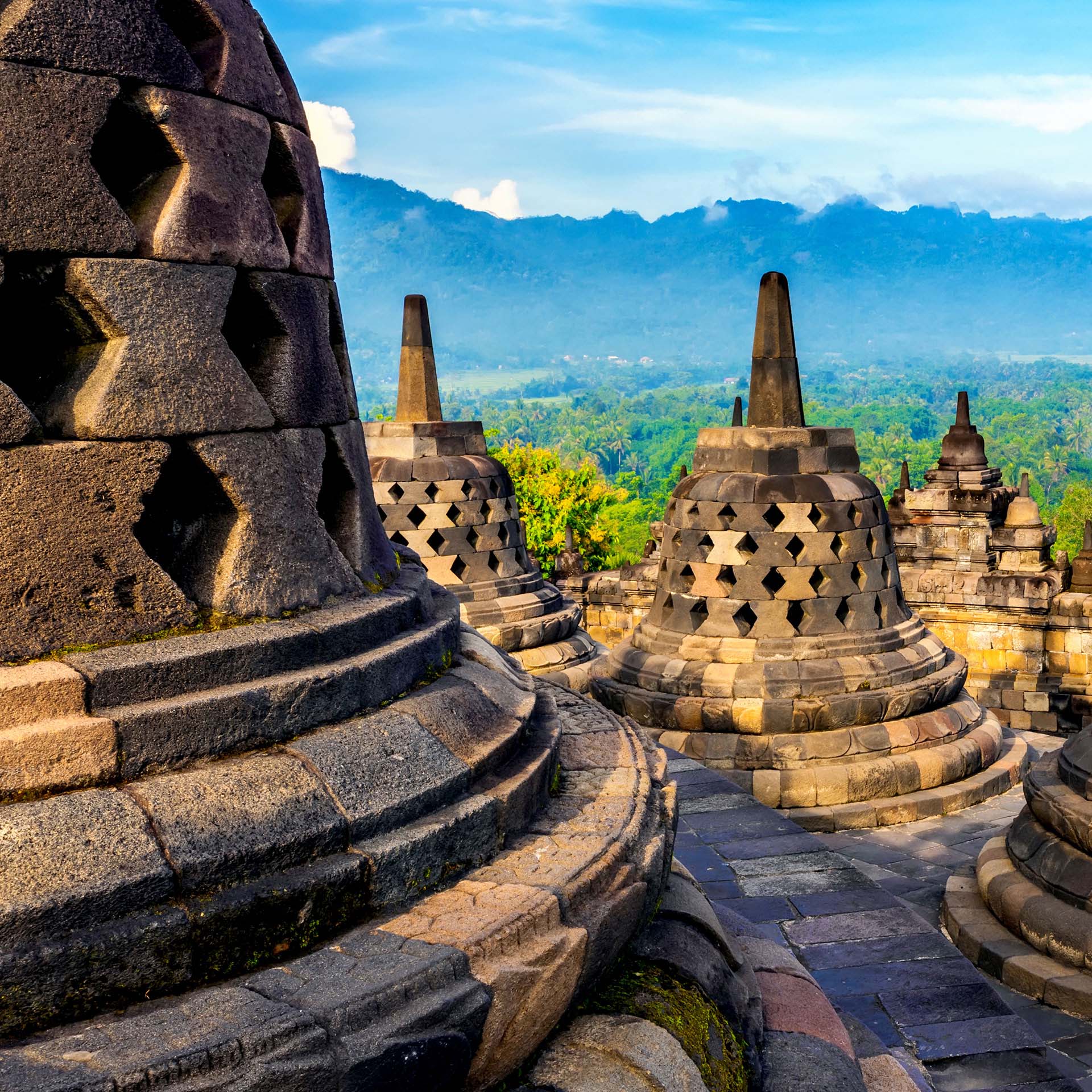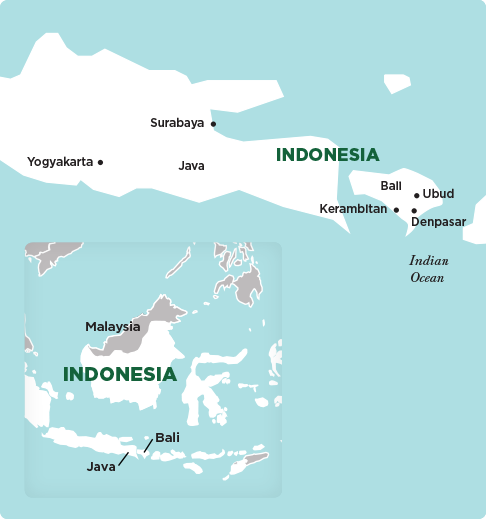Credits
16
Prerequisites
None
Language of Study
Bahasa Indonesia
Courses taught in
English
Dates
Feb 4 – May 19
Program Countries
Indonesia
Program Base
Kerambitan, Bali
Critical Global Issue of Study
Identity & Human Resilience

Explore Indonesia’s flourishing arts, diverse and historically tolerant religions, and contemporary social change that shapes sociocultural discourses on the side-by-side islands of Java and Bali.
16
None
Bahasa Indonesia
English
Feb 4 – May 19
Indonesia
Kerambitan, Bali
Identity & Human Resilience
Discover social change and the astounding dynamics of a highly pluralistic society in one of the most visually arresting, culturally diverse, and biodiverse parts of the planet. Bali, the program base, is known for its beautiful rice terraces, captivating beaches, lively temples, and distinctive art forms. Attend classes in an ancient palace, Puri Kerambitan. Then travel to witness Bali’s arts and religious ceremonies, including purification under the sacred fountains, processions to the river or ocean, the making of delicate artistic Hindu offerings, and dance performances lasting late into the night.
Explore Java’s religious sites, temples, and mosques; view street art with Javanese peers; and roam mountains. Java is the original home of tempe, fermented soybeans, and batik textiles, where culinary and fabrics have played a significant role in influencing the renowned Silk Road. In a simple village in Bali’s Tabanan district, study the local agriculture and unique practices of the subak societies, which govern rice field irrigation. Plant rice, cook traditional dishes, and make brown sugar and handicrafts. Meet healers and make traditional medicines. Hear and play Indonesia’s peculiar and widely influential traditional gamelan music that have entertained even the ancient kingdoms of Bali and Java. Attend visual arts and ballet performances, as well as Hindu and Muslim ceremonies in Bali and Java.
None


Dive deep into the arts and religion for three weeks in Java, the most populous island in Indonesia. Meet with local students of Gajah Mada University (UGM); create a batik shirt of your own design with the help of experts in Yogyakarta; visit and socialize with santri, the students of Pesantren Islamic boarding school; and visit Candi Borobudur and Candi Prambanan, the largest Buddhist monument in the world and the tallest Hindu temple in the Southeast Asian archipelago. In Solo, Central Java, learn about Confucianism, which is recognized as a religion in Indonesia.
In East Java, collaborate with students from the State University of Malang (UM) to present a topic related to critical global issues such as gender equality, sustainability, or inclusivity in a symposium. Visit some sites, including Glintung Go Green village, where the local community has transformed a flood-prone area into a sustainable village. Explore Ngadas Village, located within the area of Tengger-Bromo-Semeru National Park about two hours from the city of Malang. Participate in a lecture discussion with three local religious leaders, adherents of Buddhism, Hinduism, and Islamic faiths that harmoniously coexist while representing the village at the highest altitude of Java. Since 2018, the Indonesian government has recognized six “official religions”: Islam, Protestantism, Catholicism, Hinduism, Buddhism, and Confucianism. Discussions will focus on the efforts to sustain harmony among a pluralistic community with members of different religions, and how to protect the environment from being exploited through the implementation of the adat-istiadat, traditional laws and orders. Further learnings will include various social issues within Indonesia, such as gender equality, from our guest lecturers at UM, which students may choose to focus on for their Independent Study Project.
Spend several days in a farming village with local students in the Jembrana district of Bali, a region known for its Christian diaspora in a uniquely majority Hindu island. Test your own eco-printing skills, make brown sugar, and explore the outdoors on the periphery of the national park. Study how the arts are configured where religious activities are still closely tied to agricultural cycles and rhythms. Begin conducting interviews for a thematic seminar paper on a topic related to your Independent Study Project (ISP).
Trek along the northwest coast of Bali and visit a sleeping Buddha at a Buddhist temple on the way to Lovina, North Bali. This excursion takes you to Chinese temples, a Buddhist monastery, and a hot spring in Banjar village. Discover Bali’s geographic and cultural diversity in the mountainous area of the Bedugul Ridge, stop at Git Git waterfall, the highest waterfall in Bali, and visit Ulun Danu Beratan Temple, the main source of the irrigation system in Bali. Beratan is the second largest lake in Bali, where a scenic water temple can also be seen. Stops may also include Taman Ayun, Mengwi, a beautiful royal family temple surrounded by lily ponds.
After the excursion to Yogyakarta, plunge into issues of social change, current events, the changing environment, and tourism in Bali. Visit conservation projects and interact with Indonesian and Balinese students. Travel to urban Denpasar, exploring bookstores and the local businesses. Speak with various sources for your ISP, as well as journalists, intellectuals, and artists in the area.
Please note that SIT will make every effort to maintain its programs as described. To respond to emergent situations, however, SIT may have to change or cancel programs.
Upon successful completion of the program, students will be able to:
The following syllabi are representative of this program. Because courses develop and change over time to take advantage of dynamic learning opportunities, actual course content will vary from term to term.
The syllabi can be useful for students, faculty, and study abroad offices in assessing credit transfer. Read more about credit transfer.
Arts, Religion, and Social Change Seminar – syllabus
(ASIA3000 / 3 credits)
An interdisciplinary course conducted in English, with required readings, that draws connections between contemporary Indonesian society, politics, and economy with the historical traditions apparent in everyday life, be it urban, village, or rural. Students also explore the dynamic ways in which Balinese identity and traditional arts are changing, in response to the pressures of globalization and increased Balinese engagement with global networks. Lecturers are drawn from institutions such as the Udayana University, Universitas Negeri Malang (UM), Institute of Arts of Indonesia (ISI Denpasar and Jogjakarta), Universitas Gadjah Mada (UGM), and local NGOs. Educational excursions are an integral part of this course, and attendance at evening and weekend temple ceremonies and performances is sometimes required.
Bahasa Indonesia – syllabus
(INDO1006-1506 / 6 credits)
Bahasa Indonesia – syllabus
(INDO2006-2506 / 6 credits)
Bahasa Indonesia – syllabus
(INDO3006-3506 / 6 credits)
Emphasis on beginning speaking and comprehension skills through classroom and field instruction. Instructors are faculty of Udayana University in Denpasar. Classes are taught three to four hours daily. Based on in-country evaluation, including oral proficiency testing, students are placed in beginning, intermediate, or advanced classes. Balinese or Javanese language instruction is available for students with full competence in Indonesian.
Field Methods and Ethics – syllabus
(ANTH3500 / 3 credits)
A course in the concepts of learning across cultures and from field experience and an introduction to the Independent Study Project (ISP). Topics include cross-cultural adaptation and skills building; project selection and refinement; appropriate methodologies; field study ethics and the World Learning / SIT Human Subjects Review Policy; developing contacts and finding resources; developing skills in observation and interviewing; gathering, organizing, and communicating data; and maintaining a work journal.
In addition to taking the above courses, students will also need to enroll in one of the following two courses:
Independent Study Project
Independent Study Project – syllabus
(ISPR3000 / 4 credits)
Conducted at an approved location in Bali, Java, and other parts of Indonesia appropriate to the project. Sample topic areas: the ritual significance of gamelan music and Balinese dance; contemporary youth culture and street art; painting in the Ramayana tradition; the social-political relation of government and religion; environmental challenges of global tourism; the representation of myth in public art; traditional healing arts and modern medicine; the export of Balinese culture via tourism; traditional village life and governance; gender and economic change; irrigation management in rural Bali; the aesthetics of religious tradition in Bali; the role of women in contemporary Islamic communities of Java.
Sample ISP topic areas:
Browse this program’s Independent Study Projects / undergraduate research.
OR
Internship and Seminar
Internship and Seminar – syllabus
(ITRN3000 / 4 credits)
This seminar consists of a four-week internship with a local community organization, research organization, business, or international NGO. The aim of the internship is to enable the student to gain valuable work experience and to enhance their skills in an international work environment. Students will complete an internship and submit a paper in which they process their learning experience on the job, analyze an issue important to the organization, and/or design a socially responsible solution to a problem identified by the organization. A focus will be on linking internship learning with the program’s critical global issue focus and overall program theme. The internship course includes a module designed to help students build a foundation on which to engage in the internship experience.
Sample internships:


A diversity of students representing different colleges, universities, and majors study abroad on this program. Many of them have gone on to do amazing things that connect back to their experience abroad with SIT. Recent positions held by alumni of this program include:
Founder of Bali Recycling, Bali, Indonesia
Founder of Children’s Art Museum, Nepal
Researcher at the Institute of Ethnology, University of Heidelberg, Heidelberg, Germany
English teacher at Madrasah High School, Bandung, West Java, Indonesia
Fulbright fellow teaching English at Semarang High School
Producer for the National Geographic Channel
Professor and Chair of Pacific and Asian Studies at the University of Victoria, Canada.


SIT Study Abroad is committed to ensuring that international education is within reach for all students. We believe in the transformative power of immersive, intercultural experiences and are dedicated to supporting students in their educational journey.
See All Costs
A critical step in preparing for your study abroad program is planning how you will maintain your health and wellbeing. Please review the following information carefully and contact [email protected] with any questions or concerns.
Learn More